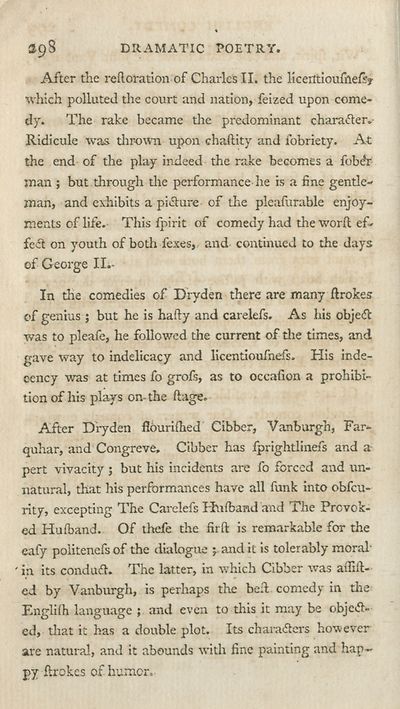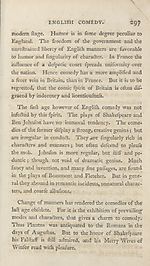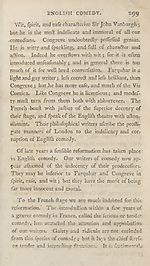Download files
Complete book:
Individual page:
Thumbnail gallery: Grid view | List view

DRAMATIC POETRY.
19 S
After the reftoration of Charles II. the licerttioufiiefsT
which polluted the court and nation, feized upon come¬
dy. The rake became the predominant charafter.
Ridicule was thrown upon chaftity and fobriety. At
the end of the play indeed the rake becomes a fobdr
man ; but through the performance lie is a fine gentle¬
man, and exhibits a picture of the pleafurable enjoy¬
ments of life. This fpirit of comedy had the worft ef-
fedt on youth of both fexes, and continued to the days
of George IL-
In the comedies of Dryden there are many ftrokes
of genius ; but he is ha fly and carelefs. As his objedt
was to pleafe, he followed the current of the times, and
gave way to indelicacy and licentioufnefs. His inde¬
cency was at times fo grofs, as to occafion a prohibi¬
tion of his plays on-the ftage.
After Dryden flourilhed Cibber, Vanburgh, Far-
quhar, and Congreve, Cibber has fprightlinefs and a
pert vivacity ; but his incidents are fo forced and un¬
natural, that his performances have all funk into obfcu-
rity, excepting The Carelefs Hu (band and The Provok¬
ed Hufband. Of thefe the firft is remarkable for the
eafy politenefs of the dialogue j and it is tolerably moral
in its condudh The latter, in which Cibber was aflift-
ed by Vanburgh, is perhaps the bed comedy in the
Englilh language ; and even to this it may be objcdt-
ed, that it has a double plot. Its charadters however
are natural, and it abounds with fine painting and hap¬
py ftrokes of humor.
19 S
After the reftoration of Charles II. the licerttioufiiefsT
which polluted the court and nation, feized upon come¬
dy. The rake became the predominant charafter.
Ridicule was thrown upon chaftity and fobriety. At
the end of the play indeed the rake becomes a fobdr
man ; but through the performance lie is a fine gentle¬
man, and exhibits a picture of the pleafurable enjoy¬
ments of life. This fpirit of comedy had the worft ef-
fedt on youth of both fexes, and continued to the days
of George IL-
In the comedies of Dryden there are many ftrokes
of genius ; but he is ha fly and carelefs. As his objedt
was to pleafe, he followed the current of the times, and
gave way to indelicacy and licentioufnefs. His inde¬
cency was at times fo grofs, as to occafion a prohibi¬
tion of his plays on-the ftage.
After Dryden flourilhed Cibber, Vanburgh, Far-
quhar, and Congreve, Cibber has fprightlinefs and a
pert vivacity ; but his incidents are fo forced and un¬
natural, that his performances have all funk into obfcu-
rity, excepting The Carelefs Hu (band and The Provok¬
ed Hufband. Of thefe the firft is remarkable for the
eafy politenefs of the dialogue j and it is tolerably moral
in its condudh The latter, in which Cibber was aflift-
ed by Vanburgh, is perhaps the bed comedy in the
Englilh language ; and even to this it may be objcdt-
ed, that it has a double plot. Its charadters however
are natural, and it abounds with fine painting and hap¬
py ftrokes of humor.
Set display mode to:
![]() Universal Viewer |
Universal Viewer | ![]() Mirador |
Large image | Transcription
Mirador |
Large image | Transcription
| Antiquarian books of Scotland > Languages & literature > Abridgement of lectures on rhetoric > (314) |
|---|
| Permanent URL | https://digital.nls.uk/135470222 |
|---|
| Description | Thousands of printed books from the Antiquarian Books of Scotland collection which dates from 1641 to the 1980s. The collection consists of 14,800 books which were published in Scotland or have a Scottish connection, e.g. through the author, printer or owner. Subjects covered include sport, education, diseases, adventure, occupations, Jacobites, politics and religion. Among the 29 languages represented are English, Gaelic, Italian, French, Russian and Swedish. |
|---|

